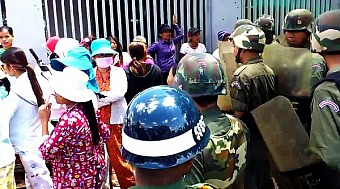Police Break up Demonstration by 2,000 Garment Workers; 8 Injured, 2 arrested
Published on 8 May 2011; Joint OrganizationsADHOC, CLEC and LICADHO strongly condemn the government's brutal dispersal of union garment workers in Phnom Penh on Sunday morning during an ongoing strike over a labor dispute that begun with the recent burning of the workers' factory. The protest left at least eight workers injured, some seriously.
Approximately 2,000 workers from Mithona garment factory gathered on Sunday morning at the burnt factory on Ponchentong Road near the capital's airport. The group intended to temporarily block the road to draw the attention of Prime Minister Hun Sen, who was scheduled to return from abroad via the airport, to their situation. The action was organized by a local wing of the Free Trade Union Workers of the Kingdom of Cambodia (FTUWKC).
Shortly after the workers initiated their roadblock, some 100 military police and police officers - armed with anti-riot shields, electric batons and guns - moved in to disperse the crowd. They fired warning shots into the air, and beat dozens of protesters. Police also reportedly drove motorbikes deliberately into the crowd, which was made up predominantly of women.
A total of eight female workers were taken to a local hospital for treatment. Their injuries included head wounds, trauma, and lacerations, two of which required stitches. Two female workers were also arrested: local FTUWKC factory leader Peng Chou, 38-years-old, and local FTUWKC member Meas Narin, 32-years-old.
"The use of violence by police was totally disproportional to the workers' actions," said Am Sam Ath, LICADHO's Monitoring Supervisor. "The government should be supporting unions on the issue of expressive rights, rather than systemically cracking down on every form of rights activism."
The workers' dispute stems from the loss of jobs following a fire at the Mithona factory on March 30, 2011. The fire destroyed the factory, and all workers were laid off. The owner offered the workers severance pay of US$20 per year worked. A worker with three years' experience would thus receive $60 - about one month's wages. Workers felt that the offer was insufficient. Phnom Penh city officials, meanwhile, publicly supported the offer in a meeting with workers mid-last week.
The owner of the destroyed factory owns two other textile plants. Union members were also unhappy after the factory owner transferred some workers - ones with no past union background - to these other factories.
"The roadblock was admittedly a serious step, but this is a serious dispute affecting thousands of workers," said Moeun Tola, Head of CLEC Labor Program. "Ordinary Cambodians have no leverage, no voice and no legal recourse in situations like this. They are simply brushed aside. People are increasingly resorting to acts of desperation. Police violence is not the way to resolve the problem."
The violence came one week to the day after more than 3,000 union workers marched in Phnom Penh to celebrate Labor Day on May 1. No violent incidents were reported at the Labor Day march.
"Authorities are willing to permit a general demonstration on major events like May 1, but as soon as workers push harder and target something specific, openness goes out the window", says Chan Soveth, Head of ADHOC Human Rights Program.
For more information, please contact:
▪ Moeun Tola, CLEC Head of Labour Program, 012 921 961
▪ Chan Soveth, ADHOC Head of Human Rights Program, 016 937 591
▪ Am Sam Ath, LICADHO Technical Supervisor, 012 327 770
PDF: Download full statement in English - Download full statement in Khmer








